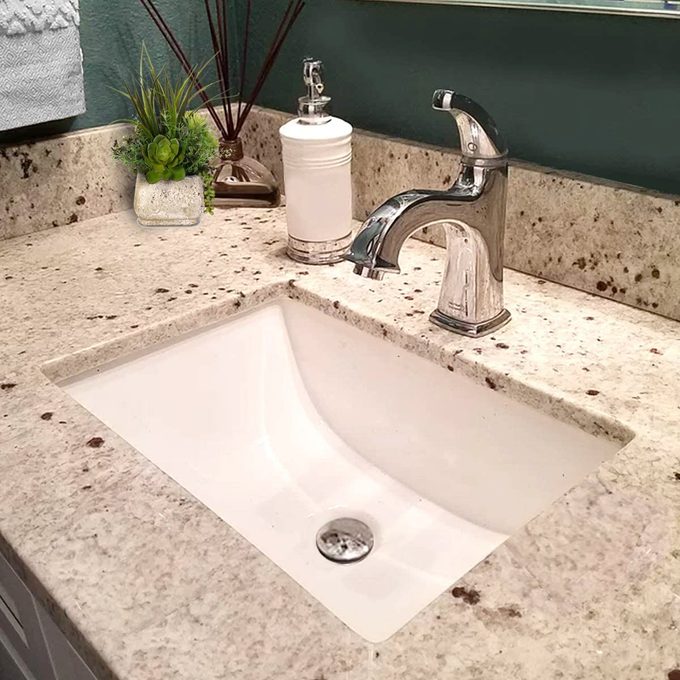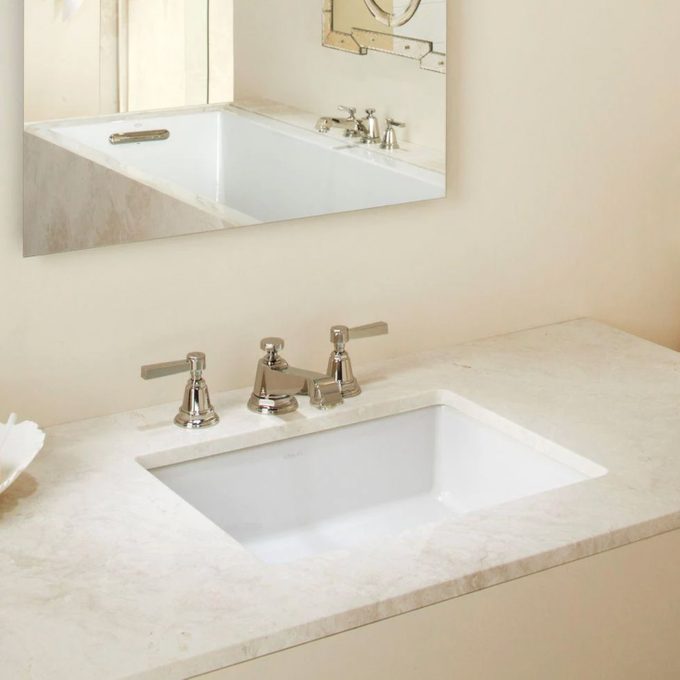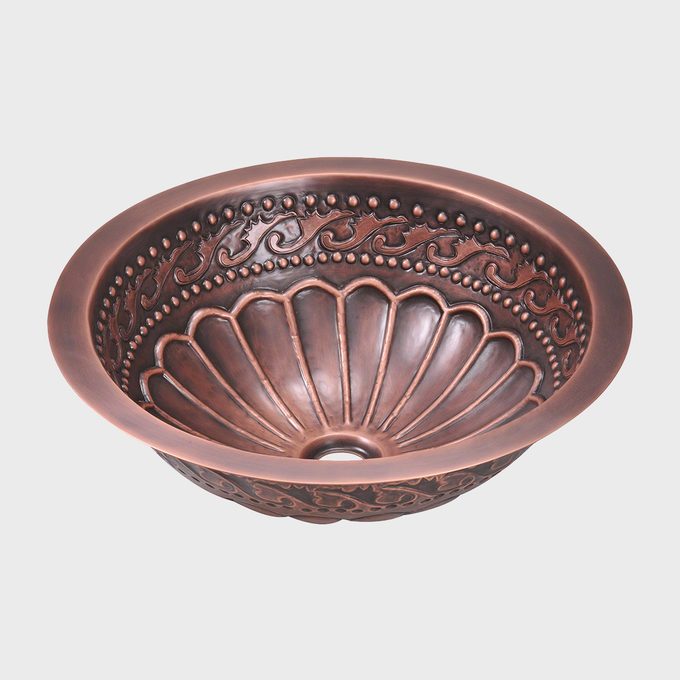The undermount bathroom sink came to North America as part of the Euro fashion trend of the mid 20th century, which stressed minimalist design elements like monochromatic wall panels and sleek stone or solid-surface countertops.
Undermount sinks fit this motif because, unlike their top-mount counterparts, they hide unassumingly under the sink opening, leaving a vast expanse of countertop space unsullied by a dirt-catching rim.
Because the countertop edge is exposed around the sink opening, undermount sinks don’t work with all countertop materials, says Massachusetts contractor Paul Conway. They match up particularly poorly with laminate countertops, because the exposed plywood core not only looks bad, it catches water and can attract mold.
On the other hand, materials that can be honed to a smooth, solid finish, such as stone, solid surface, and even butcher block and solid wood, are ideal candidates for undermount sinks.
What Is an Undermount Sink?
The best way to define an undermount bathroom sink is to compare it with a top-mount. A top-mount is supported by a rim that rests on the countertop. But an undermount sink is fastened to the underside of the countertop.
If the undermount is made from a lightweight material, you can simply glue it to the countertop. Heavy ones need to be fastened to posts secured to the countertop with epoxy cement.
Choose your reveal
Cutting a hole for an undermount bathroom sink is nowhere near as DIY-friendly as cutting one for a top-mount, because any flaw is instantly noticeable. For this reason, it’s better to purchase a countertop with a precut hole instead of cutting it yourself, especially if the countertop is stone, quartz or a similarly hard material.
It’s vital to match the sink to the hole. There are three options:
- Positive reveal: The hole in the countertop is slightly larger than the sink opening, and a small portion of the sink rim is visible. This option allows the most leeway for imperfections in the edges around the hole, and it’s easy to keep clean.
- Negative reveal: The hole in the countertop is smaller than the sink opening, and the countertop edge overhangs the sink rim by a half inch or so. This is the most streamlined look, but the edges can chip and mold can grow underneath the overhang.
- Zero reveal: The hole in the countertop and the sink opening are the same size. This option is the easiest of all to keep clean, but it calls for the most precise measurements and cutting.
Undermount Bathroom Sink Features
Undermount sinks have increased in popularity since they first appeared. Modern ones vary in several key ways:
- Material: Vitreous china, ceramic and porcelain offer the traditional glossy bathroom sink finish, while composite, metal and solid-surface materials suit those on a more avant-garde trajectory. Stone undermounts offer the ultimate in luxury.
- Weight: Stainless steel or copper sinks tend to be the lightest, while vitreous china, porcelain, ceramic and composites are moderately heavy. Choose a heavy stone, cast iron or enameled-steel undermount sink only if you’re sure the countertop can support the weight.
- Color: Undermount sinks come in gloss white, matte black and everything in between. Choose one that matches your countertop or, if you prefer drama, choose one with a contrasting color. The burnished brown tones of copper and the clean silvery hues of stainless steel work especially well with stone and solid-surface countertops.
- Shape: Undermount sinks can be square, rectangular, round or oval. Depth can vary from five to nine inches.
How To Install an Undermount Sink
Installing an undermount bathroom sink is a DIY-friendly job, as long as you keep the installation instructions for your particular model handy and follow them. Undermount sinks do not have faucet holes. The faucet has to be installed on the wall or into predrilled faucet holes in the countertop, and it usually goes in before the sink.
Depending on the model, the sink may come with posts that you attach to the underside of the countertop with epoxy, which is usually also supplied. Whether or not the sink is supported by clips attached to the posts, you have to lift it into position, center it and hold it in place while any adhesive you apply sets. Silicone caulk is one adhesive option.
There’s a simple way to do this:
- Set a 2×4 across the sink opening and center it over the drain opening.
- Hook a bar clamp onto the 2×4, lift the sink roughly into position, insert the bar through the drain opening and hook the other end onto the bottom of the sink.
- Apply adhesive around the rim of the sink and tighten the clamp to draw the sink against the underside of the countertop.
- Adjust the position of the sink to get it exactly where you want it before completely tightening the clamp. Leave the clamp in place for at least 24 hours.
Although costs vary from one situation to another, Conway estimates the average cost for professional installation is around $500, not including materials such as drain attachments and adhesives.
Best Undermount Bathroom Sinks
Undermount bathroom sinks can cost less than $50, and you can spend more than $1,000 for a designer natural-stone model. Within this considerable range is a sink for everyone.
Best value
The Nantucket UM-16×11-W, a rectangular porcelain-glazed vitreous china sink, is one of the best-reviewed low-cost undermounts available. It offers a polished appearance with an easy-to-clean surface and the added convenience of an overflow drain, all for less than $50. This sink is especially recommended for quartz countertops.
Best overall
Kohler is a leading name in bathroom sinks, and the vitreous/fireclay Verticyl is one of its top sellers. It features vertical sides, a deep bottom and an overflow drain. This sink is ADA-compliant and available in multiple finishes, including basic gloss white.
Best splurge
The Polaris Single Bowl Copper Bathroom Sink brings the sophistication of copper into your bathroom. The hand-tooled design helps mask the small scratches that inevitably appear on copper, and the round bowl is a perfect fit for a small bathroom. This versatile sink can also be installed in a top-mount or vessel sink format.
Article source here: Undermount Bathroom Sink Buyer’s Guide





No comments:
Post a Comment